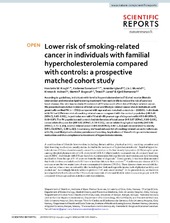Lower risk of smoking-related cancer in individuals with familial hypercholesterolemia compared with controls: a prospective matched cohort study
Krogh, Henriette Walaas; Svendsen, Karianne; Igland, Jannicke; Mundal, Liv; Holven, Kirsten Bjørklund; Bogsrud, Martin Prøven; Leren, Trond Paul; Retterstøl, Kjetil
Peer reviewed, Journal article
Published version

Åpne
Permanent lenke
https://hdl.handle.net/1956/22177Utgivelsesdato
2019-12-17Metadata
Vis full innførselSamlinger
Originalversjon
https://doi.org/10.1038/s41598-019-55682-xSammendrag
According to guidelines, individuals with familial hypercholesterolemia (FH) shall receive lifestyle intervention and intensive lipid-lowering treatment from early in life to reduce the risk of coronary heart disease. Our aim was to study if treatment of FH also could affect risk of lifestyle-related cancer. We presented cumulative incidence of total cancer and lifestyle-related cancer sites in individuals with genetically verified FH (n = 5531) compared with age and sex matched controls (n = 108354). Individuals with FH had 20% lower risk of smoking-related cancer compared with the control population [HR 0.80 (95% CI, 0.65–0.98)], in particular men with FH at 40–69 years at age of diagnosis with HR 0.69 (95% CI, 0.49–0.97). The FH population and controls had similar rates of total cancer [HR 0.97 (95% CI, 0.86–1.09)], cancer related to poor diet [HR 0.82 (95% CI, 0.59–1.15)], cancer related to physical inactivity [HR 0.93 (95% CI, 0.73–1.18)], alcohol-related cancer [HR 0.98 (95% CI, 0.80–1.22)] and cancer related to obesity [HR 1.03 (95% CI, 0.89–1.21)]. In summary, we found reduced risk of smoking-related cancer in individuals with FH, most likely due to a lower prevalence of smoking. Implications of these findings can be increased motivation and thus compliance to treatment of hypercholesterolemia.
